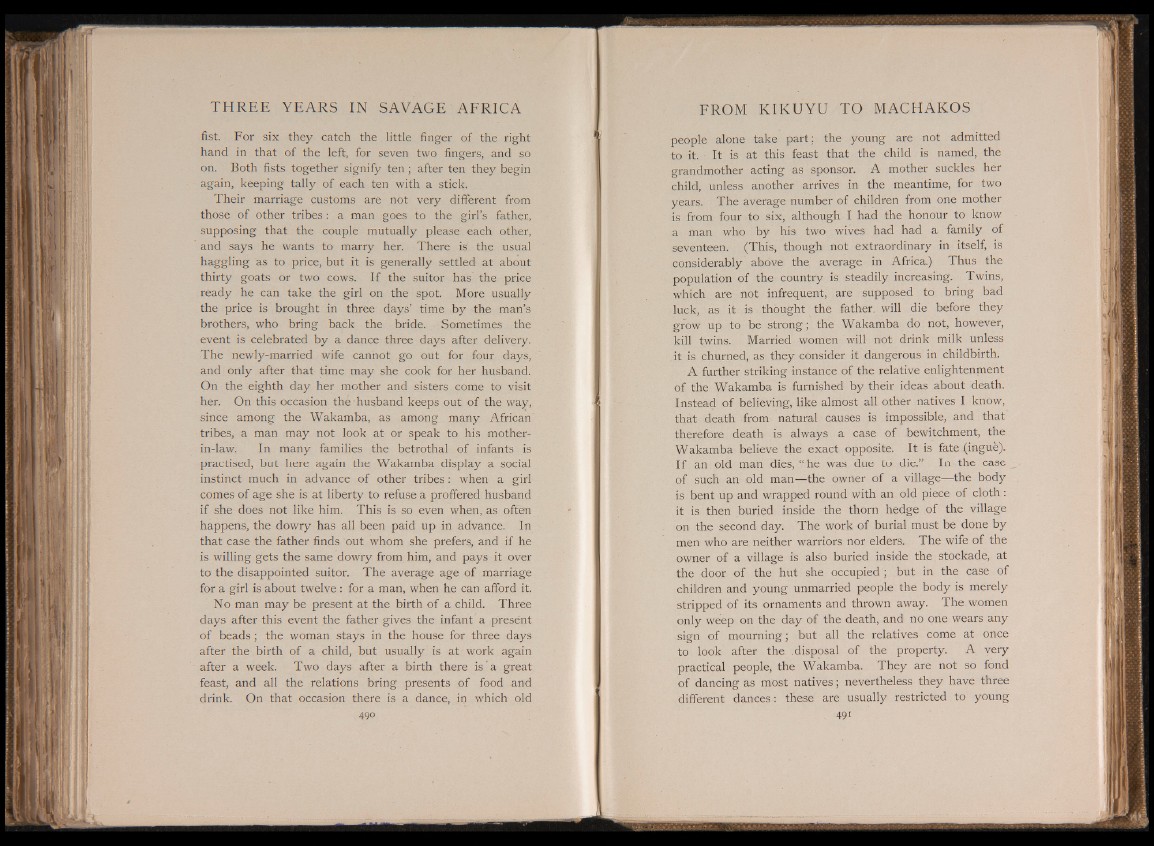
fist. For six they catch the little finger of the right
hand in that of the left, for seven two fingers, and so
on. Both fists together signify ten; after ten they begin
again, keeping tally of each ten with a stick.
Their marriage customs are not very different from
those of other tribes: a man goes to the girl’s father,
supposing that the couple mutually please each other,
and says he wants to marry her. There is the usual
haggling as to price, but it is generally settled at about
thirty goats or two cows. If the suitor has the price
ready he can take the girl on the spot. More usually
the price is brought in three days’ time by the man’s
brothers, who bring back the bride. Sometimes the
event is celebrated by a dance three days after delivery.
The newly-married wife cannot go out for four days,
and only after that time may she cook for her husband.
On the eighth day her mother and sisters come to visit
her. On this occasion the husband keeps out of the way,
since among the Wakamba, as among many African
tribes, a man may not look at or speak to his mother-
in-law. In many families the betrothal of infants is
practised, but here again the Wakamba display a social
instinct much in advance of other tribes : when a girl
comes of age she is at liberty to refuse a proffered husband
if she does not like him. This is so even when, as often
happens, the dowry has all been paid up in advance. In
that case the father finds out whom she prefers, and if he
is willing gets the same dowry from him, and pays it over
to the disappointed suitor. The average age of marriage
for a girl is about twelve : for a man, when he can afford it.
No man may be present at the birth of a child. Three
days after this event the father gives the infant a present
of beads; the woman stays in the house for three days
after the birth of a child, but usually is at work again
after a week. Two days after a birth there is a great
feast, and all the relations bring presents of food and
drink. On that occasion there is a dance, in which old
people alone take part; the young are not admitted
to it. It is at this feast that the child is named, the
grandmother acting as sponsor. A mother suckles her
child, unless another arrives in the meantime, for two
years. The average number of children from one mother
is from four to six, although I had the honour to know
a man who by his two wives had had a family of
seventeen. (This, though not extraordinary in itself, is
considerably above the average in Africa.) Thus the
population of the country is steadily increasing. Twins,
which are not infrequent, are supposed to bring bad
luck, as it is thought the father, will die before they
grow up to be strong; the Wakamba do not, however,
kill twins. Married women will not drink milk unless
it is churned, as they consider it dangerous in childbirth.
A further striking instance of the relative enlightenment
of the Wakamba is furnished by their ideas about death.
Instead of believing, like almost all other natives I know,
that death from natural causes is impossible, and that
therefore death is always a case of bewitchment, the
Wakamba believe the exact opposite. It is fate (ingue).
I f an old man dies, “ he was due to die.” In the case
of such an old man—the owner of a village—the body
is bent up and wrapped round with an old piece of cloth:
it is then buried inside the thorn hedge of the village
on the second day. The work of burial must be done by
men who are neither warriors nor elders. The wife of the
owner of a village is also buried inside the stockade, at
the door of the hut she occupied ; but in the case of
children and young unmarried people the body is merely
stripped of its ornaments and thrown away. The women
only weep on the day of the death, and no one wears any
sign of mourning; but all the relatives come at once
to look after the .disposal of the property. A very
practical people, the Wakamba. They are not so fond
of dancing as most natives; nevertheless they have three
different dances: these are usually restricted to young